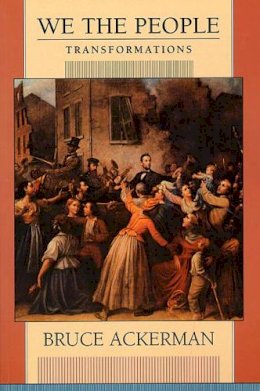
We the People, Volume 2: Transformations
Bruce Ackerman
Constitutional change, seemingly so orderly, formal, and refined, has in fact been a revolutionary process from the first, as Bruce Ackerman makes clear in We the People: Transformations. The Founding Fathers, hardly the genteel conservatives of myth, set America on a remarkable course of revolutionary disruption and constitutional creativity that endures to this day. After the bloody sacrifices of the Civil War, Abraham Lincoln and the Republican Party revolutionized the traditional system of constitutional amendment as they put principles of liberty and equality into higher law. Another wrenching transformation occurred during the Great Depression, when Franklin Roosevelt and his New Dealers vindicated a new vision of activist government against an assault by the Supreme Court.
These are the crucial episodes in American constitutional history that Ackerman takes up in this second volume of a trilogy hailed as "one of the most important contributions to American constitutional thought in the last half-century" (Cass Sunstein, New Republic). In each case he shows how the American people--whether led by the Founding Federalists or the Lincoln Republicans or the Roosevelt Democrats--have confronted the Constitution in its moments of great crisis with dramatic acts of upheaval, always in the name of popular sovereignty. A thoroughly new way of understanding constitutional development, We the People: Transformations reveals how America's "dualist democracy" provides for these populist upheavals that amend the Constitution, often without formalities.
The book also sets contemporary events, such as the Reagan Revolution and Roe v. Wade, in deeper constitutional perspective. In this context Ackerman exposes basic constitutional problems inherited from the New Deal Revolution and exacerbated by the Reagan Revolution, then considers the fundamental reforms that might resolve them. A bold challenge to formalist and fundamentalist views, this volume demonstrates that ongoing struggle over America's national identity, rather than consensus, marks its constitutional history.
Product Details
About Bruce Ackerman
Reviews for We the People, Volume 2: Transformations
Sanford Levinson, of the University of Texas's law school, has called it 'The most important project now under way in the entire field of constitutional theory'...This is one professor, it's safe to say, who couldn't be accused of dodging the big questions.
Christopher Shea
The Chronicle of Higher Education
We the People: Transformations is a welcome return to a sort of constitutional and political history that is no longer fashionable in the academy, where social history is now ascendant. It is, in addition, a lively and informative read.
Adam Wolfson
Commentary
[Bruce Ackerman's] particular constitutional focus is Article Five, that lays down the rules for the process of constitutional amendments, and how "We the people" have transformed the constitution in ways not laid down by such rules in the three most significant constitutional processes in American history: 1787, Reconstruction, and the New Deal...[This] book may serve as an instance of American Studies at its very best...Ackerman's analyses and arguments may at times be controversial but they are always clearly and convincingly expressed. Running through its narrative and serving to make it a compelling one is the story of how the United States has developed from a federation of states to a nation.
Orm Overland
American Studies in Europe
We the People offers a thoroughly researched, provocative, and passionate counterpoint to the now stale debate over original intent as a guide to constitutional understanding.
Kermit L. Hall
Journal of American History
This is a superb, provocative, and often gripping account of how We the People mobilize to produce constitutional change. A wonderful blend of history, political science, and constitutional law, this volume attempts to vindicate Ackerman's striking claim that the Civil War and the New Deal inaugurated large-scale constitutional transformations.
Cass Sunstein, University of Chicago Law School Two myths sustain the American people, Ackerman suggests. The first holds that the federal government consistently ignores the will of the people, whose mandate must constantly be pressed against its compromised and uncompromising leaders. The second is that our Constitution is so artfully constructed that changing it, for good or bad, is nearly impossible. Drawing on subtle legal argument and a solid command of history, Ackerman goes on to suggest that although the first scenario may seem to be accurate, the second is certainly not; governments have frequently bent the Constitution to serve their ideological ends...Readers well grounded in constitutional law will find Ackerman's arguments fascinating and provocative.
Kirkus Reviews
In an analysis which is by turns breezy, scholarly and impassioned, Ackerman investigates the origins of those 'transformative moments' in the past when the American people have engaged in a 'deepening institutional dialogue' with political elites to adapt and renew the United States Constitution, thereby reaffirming and extending popular sovereignty…The energy and learning with which its case is advanced make Transformations the most provocative intellectual history of constitutional issues published in many a year.
Peter Thompson
English Historical Review
